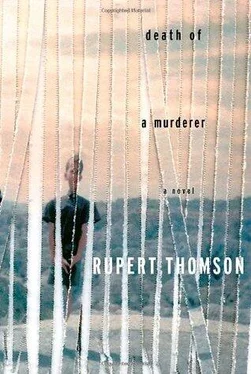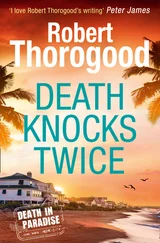“What was it?”
“It’s all right. It was nothing.” He gave her a smile that was supposed to be efficient and reassuring. “Thanks, anyway.”
As he hurried off towards the mortuary, he was aware that the nurse was probably still watching him. Had she seen him running his hand over the wall? And if so, what sense could she possibly have made of it?
There was a name he could no longer avoid. It had come to him on Friday, when he sat in his car and listened to the news, and then again on Saturday, when he went walking in the woods. It had come even more strongly when Phil Shaw showed him the fridge where the woman’s body was being kept. During the past few hours it had grown more and more powerful until it seemed that the name had a voice, and it was calling out to him, demanding his attention.
Four years ago, in the autumn of 1998, he had been summoned to Northampton to give evidence in a trial. He hadn’t been able to leave Ipswich until the late afternoon, and after driving for about two hours he had checked into a Travel Inn at the junction of the A14 and the A1, not far from Huntingdon. His room was tidy and overheated, with a big double bed and a notice you could hang outside your door that said SSSSHHH…FAST ASLEEP. Like most Travel Inns, it made you feel as if you’d ended up in the middle of nowhere. Their locations seemed determined largely by the presence of a main road or a motorway; apart from that, they didn’t appear to have any connection with real life at all. This would be a terrible place to die, he remembered thinking as he set his case down on the bed.
On the far side of the car-park was a large, partially timbered building that the brochure referred to as the “food barn.” It had a restaurant and a bar, and on that particular night it was full of lorry-drivers, travelling salesmen, and a party of high-spirited golfers from a club in Warwickshire. Billy was halfway through his Chicken Kiev when a man in a grey suit jerked to a standstill in front of his table.
“Billy Tyler?”
Billy stared up into the man’s face. “My God,” he said. “Trevor? Is that you?”
He rose quickly to his feet, and the two men shook hands.
“Billy Tyler,” Trevor said again, but in a tone of wonderment this time.
Billy was grinning now. “What a coincidence.”
Trevor Lydgate had been in the year above Billy at primary school, but their mothers were friends so they had played in each other’s houses from an early age. Their friendship hadn’t lasted long, though, because the Lydgates moved away, to Manchester, and the two boys gradually lost touch.
“Look, you finish your meal,” Trevor said, “then come and join me for a drink. I’m over there, in the corner.”
Billy watched the thin, balding man move away across the bar — he remembered a slender boy with light-brown hair — then he sat down again. Picking up his fork, he smiled to himself and shook his head. So there was a reason for these out-of-the-way places after all…
A few minutes later, he was sitting in a booth with Trevor, drinking pints of Stella and catching up on the events of the last twenty-five or thirty years. They both drank fast, excited by the chance reunion, and determined to make the most of it. Every now and then, their conversation would reach into the distant past, as if for a point of reference, a touchstone; they wanted to emphasise the unlikely nature of their meeting — or to make sure that it was all true, perhaps, to prove that the things they remembered had actually happened, that they really were who they said they were.
Trevor was married, with four children. Three boys and a girl. He worked for a firm that manufactured pottery. Plates, mugs, bowls — that sort of stuff. The firm was downsizing, though, and he would soon be looking for another job. At his age, he didn’t think it would be easy. “I’m in my forties now,” he said. “Can you believe it?” Trevor sounded amazed, almost jubilant, and yet, at the same time, Billy saw anxiety pass over his face, as sudden and fleeting as the shadow of a cloud. In any case, Trevor went on quickly, he would cross that bridge when he came to it. He was living in Staffordshire, in a town called Stone. It was very handy for the M6.
“But tell me about you, Billy,” Trevor said, leaning forwards over the table. “What have you been up to?”
Billy couldn’t help smiling at Trevor’s eagerness. He seemed so interested. As if any news of Billy’s would delight him, just so long as Billy could manage to put it into words. It was a childlike quality, one not generally found in people who were middle-aged: either they had lost it along the way, or else they’d had it ground out of them.
“I’m in the police,” Billy said.
“Really? I’ve never met a policeman. I mean, not socially.”
“We’re all right, you know. We’re human.”
Trevor beamed. “You know, I didn’t used to trust the police. Back in the late seventies, I mean, when Thatcher first came in. Now, though, I think it would be a fascinating job. Who knows, if I get fired, I might even become one myself — or is it too late for me?”
“It’s not exactly well paid,” Billy said, “and you do have a large family…”
“That’s true.” Trevor nodded, then drank.
Though he appeared to be agreeing with Billy, he had by no means been put off the idea. Trevor seemed to be a man who was given to continual small enthusiasms. He would probably be exhausting to live with.
“Four children,” Billy mused. “How do you do it?”
“Ask my wife.” Trevor chuckled, shook his head. “What about you, Billy? Have you got kids?”
“I’ve got a daughter,” Billy said. “Emma. She’s got Down’s.”
This piece of information would have thrown most people. Not Trevor, though.
“How bad is it?” he said.
“We’re lucky, really. On a scale of one to ten, she’s probably seven or eight. I mean, she’s fantastic, I love her to bits, but it’s still difficult.”
“You must worry…”
“She’s four and a half, and she can’t talk properly. She just makes sounds. Their tongues are bigger, you see.” Billy swallowed some more lager. “Her eyes are bad too. She had to have an operation to tighten the muscles. And she has to wear special shoes to help her stand up…” Billy thought about mentioning her heart, but he just couldn’t bear it.
“I expect you have to watch her all the time,” Trevor said.
Billy nodded. “Yes. Non-stop.”
It was his round. He went up to the bar and ordered two more pints. Before he could even sit down with the new drinks, Trevor was talking again.
“If you think about it, though, we all have to watch our children now, don’t we? So many things can happen to them. When we were young, it was different.” He reached for his new pint and took a gulp. “Back then, it was all woods and fields, and we’d be gone for the whole day, and no one even thought twice…”
Trevor’s voice had started trembling halfway through the sentence, but then it gave out completely, and he put his face in his hands. Billy stared at Trevor’s bald spot, unable for a moment to believe what was happening.
“Trevor?” he said. “What is it?”
But Trevor wouldn’t answer. He sat in the booth with his hands covering his face, his whole body shaking.
“What’s wrong, Trevor?”
People were beginning to look at them, wondering what was going on. There’s a bloke crying over there.
Billy clambered to his feet and put an arm round Trevor’s shoulders. “Come on, Trevor. Let’s get you back to your room.”
He picked Trevor’s key up off the table, and they left the food barn together, with Billy taking most of Trevor’s weight. Once outside, the cold air hit them. The wind was swooping in from the east, over the landscaped banks and mounds, and Billy thought he could smell snow. That keen, metallic edge. When he lifted his head, the cars bounced beneath the yellow lights. Their shiny surfaces swirled glassily about. How many pints had they had? Six? Seven?
Читать дальше












